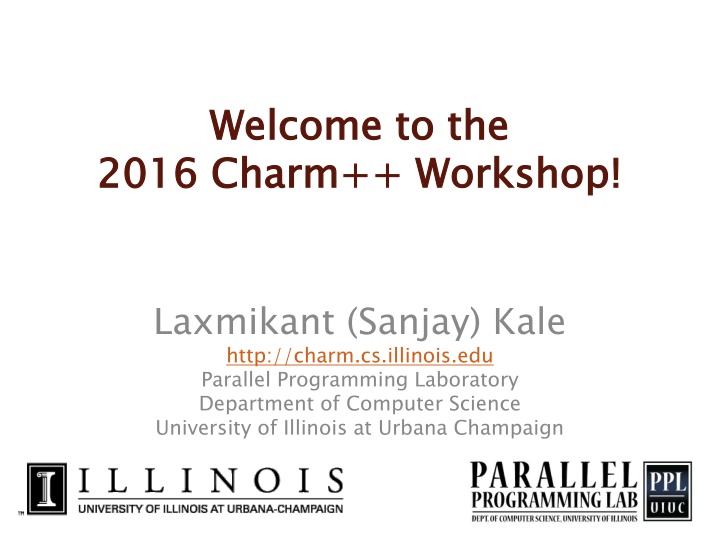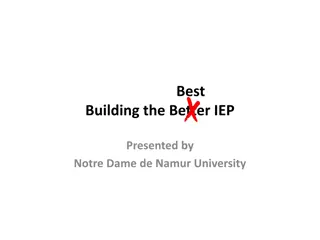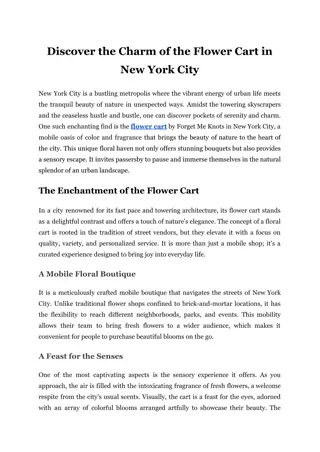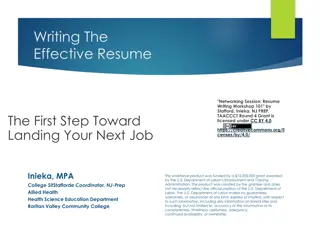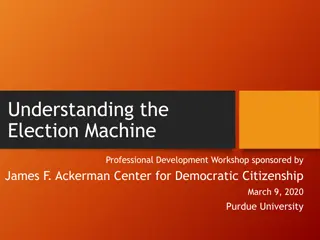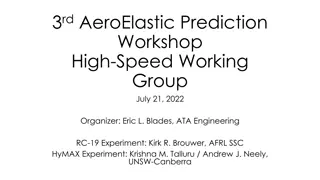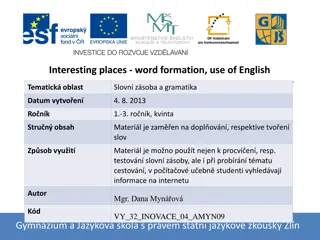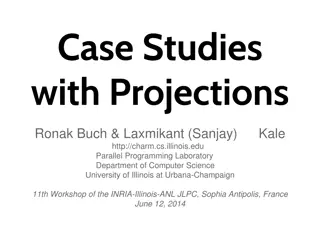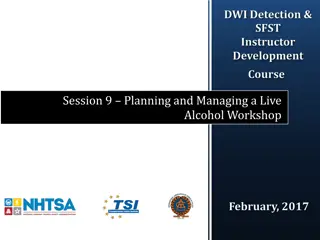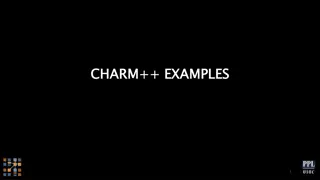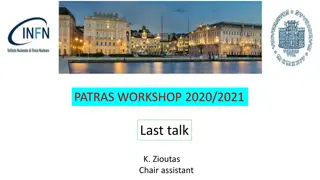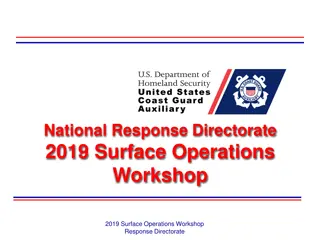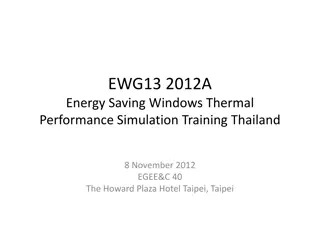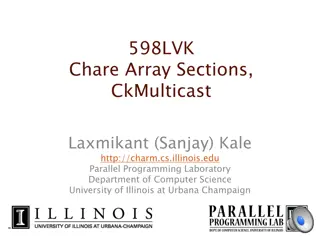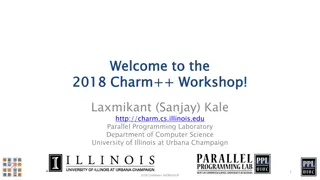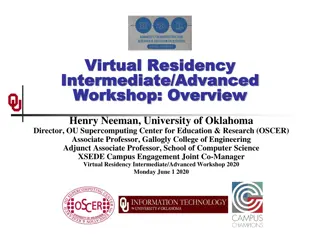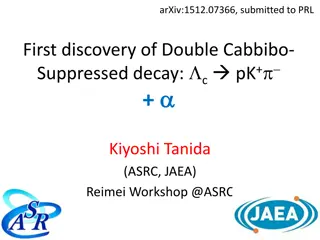Charm++ Workshop Insights
Charm++ Workshop 2016 provided valuable insights on overdecomposition, migratability, asynchrony, and message-driven execution. Topics included adapting to variability in hardware and empowering the runtime system for better performance and adaptivity.
Download Presentation

Please find below an Image/Link to download the presentation.
The content on the website is provided AS IS for your information and personal use only. It may not be sold, licensed, or shared on other websites without obtaining consent from the author.If you encounter any issues during the download, it is possible that the publisher has removed the file from their server.
You are allowed to download the files provided on this website for personal or commercial use, subject to the condition that they are used lawfully. All files are the property of their respective owners.
The content on the website is provided AS IS for your information and personal use only. It may not be sold, licensed, or shared on other websites without obtaining consent from the author.
E N D
Presentation Transcript
Welcome to the 2016 Charm++ Workshop! Welcome to the 2016 Charm++ Workshop! Laxmikant (Sanjay) Kale http://charm.cs.illinois.edu Parallel Programming Laboratory Department of Computer Science University of Illinois at Urbana Champaign
A couple of forks Overdecomposition + Migratability MPI + x Task Models Asynchrony Overdecomposition and migratability: Most adaptivity MPI+X Task Models 2
Overdecomposition Decompose the work units & data units into many more pieces than execution units Cores/Nodes/.. Not so hard: we do decomposition anyway 3
Migratability Allow these work and data units to be migratable at runtime i.e. the programmer or runtime, can move them Consequences for the app-developer Communication must now be addressed to logical units with global names, not to physical processors But this is a good thing Consequences for RTS Must keep track of where each unit is Naming and location management 4
Asynchrony: Message-Driven Execution Now: You have multiple units on each processor They address each other via logical names Need for scheduling: What sequence should the work units execute in? One answer: let the programmer sequence them Seen in current codes, e.g. some AMR frameworks Message-driven execution: Let the work-unit that happens to have data ( message ) available for it execute next Let the RTS select among ready work units Programmer should not specify what executes next, but can influence it via priorities 5
Charm++ Charm++ began as an adaptive runtime system for dealing with application variability: Dynamic load imbalances Task parallelism first (state-space search) Iterative (but irregular/dynamic) apps in mid- 1990s But it turns out to be useful for future hardware, which is also characterized by variability Charm++ workshop 2014 6
Message-driven Execution A[..].foo( ) Processor 1 Processor 2 Scheduler Scheduler Message Queue Message Queue Charm++ workshop 2014 7
Empowering the RTS Adaptive Runtime System Adaptivity Introspection Asynchrony Migratability Overdecomposition The Adaptive RTS can: Dynamically balance loads Optimize communication: Spread over time, async collectives Automatic latency tolerance Prefetch data with almost perfect predictability Charm++ workshop 2014 8
What Do RTSs Look Like: Charm++ Charm++ workshop 2014 9
PPL Highlights of last year Petascale Applications made excellent progress ChaNGa, NAMD, EpiSimdemics, OpenAtom They are all current, past or upcoming PRAC applications, selected by NSF for large allocations for science on Blue Waters! Charm++ workshop 2014 10
External Evaluation of Charm++ Sandia@Livermore evaluated Charm++ Robert Clay, Janine Bennett, David Hollman, Jeremiah Wilkes, and Sandia team Selected Charm++ along with Legion and Uintah Week-long exploration by a team Eric Mikida and Nikhil Jain from PPL Mini-aero was implemented.. With load balancing, resilience, etc. ! Sandia report Intel exploration continues Tim Mattson, Robert Wijngaart, [Jeff Hammond] Summer intern implemented PRK benchmarks Charm++ workshop 2014 11
Episimdemics Simulation of epidemics: Collaboration with Madhav Marathe et al a Virginia Tech, and Livermore Converted from original MPI to Charm++ Recent results scale to most of blue waters Many optimizations that exploit asynchrony of Charm++ Charm++ workshop 2014 12
Charmworks, Inc. A path to long-term sustainability of Charm++ Commercially supported version Focus on 10-1000 nodes at Charmworks Existing collaborative apps to continue with same licensing (NAMD, OpenAtom) as before University version continues to be distributed Freely, in source code form, for non-profits Code base: Committed to avoiding divergence for a few years Charmworks codebase will be streamlined We will be happy to take your feedback Charm++ workshop 2014 13
Charmworks contributions Past or ongoing relevant work: Eclipse plugin Charmdebug improvements Significantly improved robust parsing of .ci files Packaging scripts: spack, GPU manager with shared memory nodes Accel framework Default parameter choices Automation of checkpoint/restart scheduling Metabalancer integration Performance report Charm++ workshop 2014 14
Graduating Doctoral Students! In the first half of 2016, mostly Nikhil Jain (LLNL) Jonathan Lifflander (Sandia @ Livermore) Xiang Ni (IBM Research) Phil Miller (charmworks) Harshitha Menon Charm++ workshop 2014 15
Workshop Overview Keynotes Barbara Chapman (today) Thomas Sterling (tomorrow morning) Invited talks: Applications Charm++ features and capabilities Within-node parallelism, AMPI, Panel: Higher Level Abstractions Charm++ workshop 2014 16
